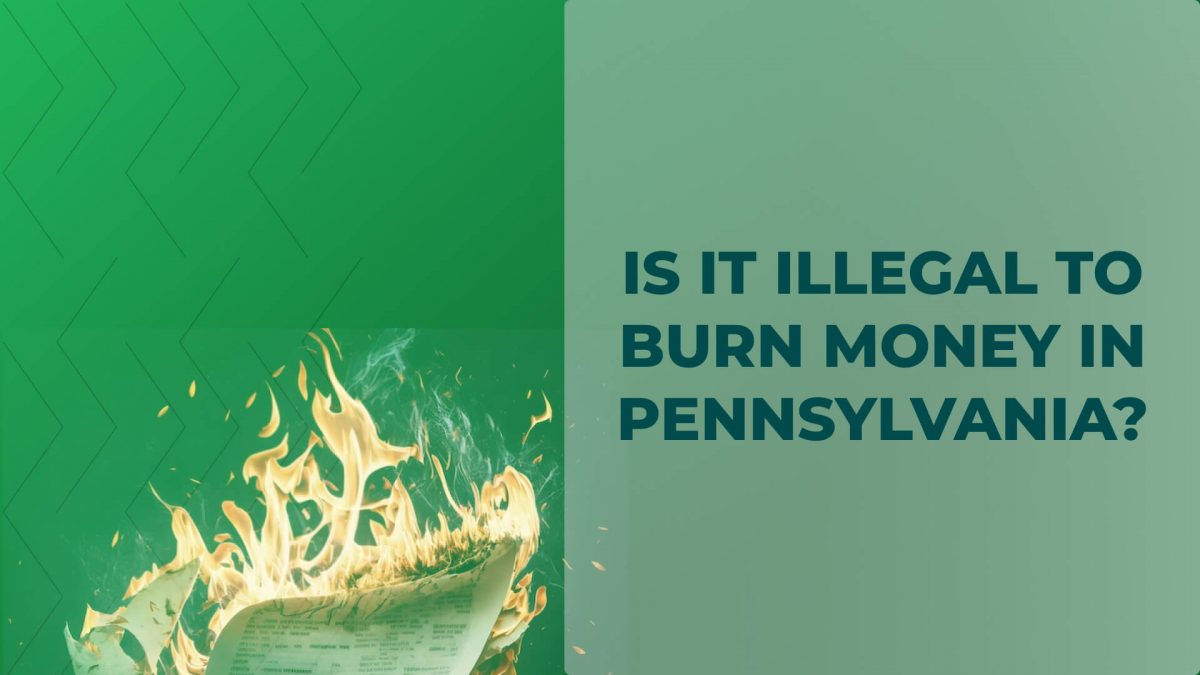Many questions about the legality of certain actions revolve around state law, but when it comes to the destruction of U.S. currency, such as burning money, federal law holds the ultimate authority. This comprehensive guide will delve into the implications of this for residents of Pennsylvania.
Federal Laws Governing the Destruction of Currency
The idea of burning money might appear to fall within the jurisdiction of individual states, but this is not the case. The destruction of U.S. currency, including burning, is governed by federal law, which applies equally across the entire country. This means the law is not state-specific and, therefore, doesn’t change based on your location, whether you’re in Pennsylvania or California.
The United States Secret Service, a federal law enforcement agency under the U.S. Department of Homeland Security, has the task of maintaining the integrity of the nation’s currency. To this end, one of the laws it enforces is Title 18, Section 333 of the United States Code. This law pertains specifically to the mutilation or destruction of U.S. banknotes.
What Does the Law Say?
Title 18, Section 333 of the U.S. Code takes a clear stance on the defacement or destruction of U.S. currency. This section stipulates that anyone who “mutilates, cuts, defaces, disfigures, or perforates, or unites or cements together, or does any other thing to any bank bill, draft, note, or other evidence of debt issued by any national banking association, or Federal Reserve Bank, or the Federal Reserve System, with intent to render such bank bill, draft, note, or other evidence of debt unfit to be reissued,” may be fined, imprisoned for up to six months, or both.
In simpler terms, this law makes it illegal to deliberately alter or destroy U.S. currency with the intent to render it unfit for reissue. The goal of this law is to protect the integrity of the monetary system by ensuring that currency remains in circulation and retains its intended form.
The Interpretation of the Law
While the wording of the law appears straightforward, its interpretation often hinges on one key factor: intent. The law takes into account whether the person defacing or destroying the currency intends to make it unfit for reissue. For instance, if someone burns a large sum of money deliberately to reduce the amount of money in circulation, such an act would likely be interpreted as illegal.
It’s important to note that this doesn’t necessarily make all forms of currency destruction illegal. For instance, if a child innocently defaces a small amount of money during play, the lack of malicious intent to render the currency unfit for reissue could potentially be a determining factor in how the law is applied.
Applying the Law in Pennsylvania
As the law governing the destruction of currency is federal, it applies uniformly across all states, Pennsylvania included. This means that if you are residing in Pennsylvania and intentionally burn money, particularly with the purpose of rendering it unfit for reissue, you could be found in violation of federal law.
The penalties for violating Title 18, Section 333, can include a fine, imprisonment for up to six months, or both. These penalties underscore the seriousness with which the U.S. government takes the defacement or destruction of its currency.
Are There Any Exceptions to the Rule?
While the law is quite clear, there can be exceptions in certain circumstances. If a bill is significantly damaged — more than 50% of it is missing or it’s otherwise unrecognizable — the Federal Reserve Bank typically permits its destruction, as it’s already considered unfit for reissue.
Moreover, it’s worth noting that certain forms of currency destruction may fall into a legal gray area. For instance, coin mutilation for artistic purposes (e.g., pressed pennies) is generally tolerated, despite technically violating U.S. Code Title 18, Section 331.
What Should You Do with Damaged or Old Currency?
If you come across damaged or old currency that’s unfit for circulation, you should refrain from trying to destroy it yourself. Instead, most local banks will typically allow you to exchange it. They then send the damaged currency back to the Federal Reserve, which has established procedures for removing such bills from circulation.
By following this process, you can ensure that damaged currency is handled properly and legally. Moreover, you might be able to exchange your damaged currency for new, which can be particularly helpful if you’ve discovered old, damaged bills.
Importance of Respecting U.S. Currency
U.S. currency serves not just as a medium of exchange but also as a symbol of the stability and integrity of the nation’s economy. Consequently, it’s important that individuals respect U.S. currency and abide by the laws protecting it.
The destruction of currency not only poses potential legal consequences but also undermines the symbolic value of the currency. Therefore, even beyond legal considerations, it’s generally considered good practice to treat U.S. currency with respect.
Summary and Key Takeaways
In conclusion, burning money in Pennsylvania — or any other state for that matter — is governed by federal law. Unless you want to face potential legal penalties, it’s advisable to refrain from burning or otherwise defacing U.S. currency.
Always remember that if you come across damaged or old currency, the best course of action is to exchange it at a local bank. This ensures that the currency is properly and legally handled and keeps you on the right side of the law.

